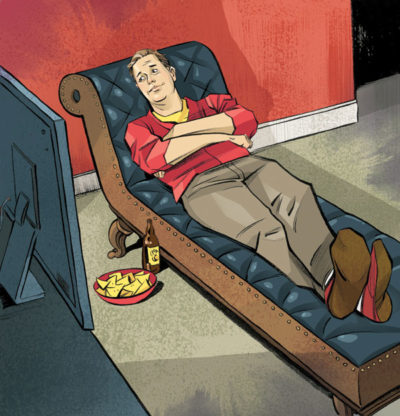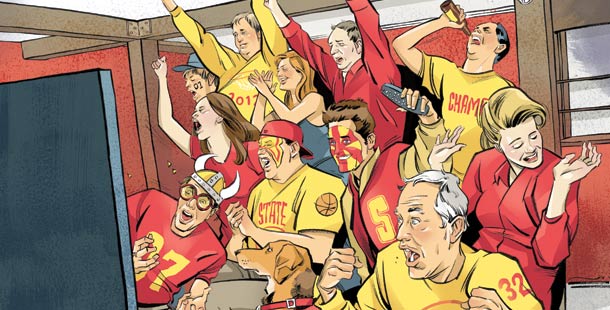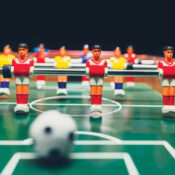Let the madness begin!
March is the time when vasectomies increase by 50 percent thanks to the much-anticipated opportunity for patients to “recover” in front of their TVs.
March is also the time when workplaces do some real number-crunching: on the expected loss in employee productivity (estimated at 8.4 million hours and $192 million last year); on money bet on office pools (a hefty chunk of the $2.5 billion in total sports wagering each year); and even on the number of times workers hit the so-called “Boss Button” (computer software that instantly hides live video of games with a phony business spreadsheet), which was activated more than 3.3 million times during the first four days of last year’s tournament.
But mostly, the NCAA Basketball Championship—better known as “March Madness” or “The Big Dance”—is a time that gives us something to cheer about beyond the game itself. If history and science hold true, no matter the outcome of the three-week tournament that begins in March, most of the millions who will follow its hard-court action will emerge as winners. “That’s because in the long run it’s really not the games that matter,” says Daniel Wann, Ph.D., a professor of psychology at Murray State University in Kentucky and author of Sports Fans: The Psychology and Social Impact of Spectators. “Being a fan gives us something to talk about, to share and bond with others. And for the vast majority of people, it’s psychologically healthier when you can increase social connections with others.”
After conducting some 200 studies over the past two decades, Wann, a leading researcher on “sports fandom,” finds consistent results: people who identify themselves as sports fans tend to have lower rates of depression and higher self-esteem than those who don’t. Blame it on our primal nature. “Sports fandom is really a tribal thing,” says Wann, a phenomenon that can help fulfill our psychological need to belong—providing similar benefits to the social support achieved through religious, professional, or other affiliations. “We’ve known for decades that social support—our tribal network—is largely responsible for keeping people mentally sound. We really do have a need to connect with others in some way.”
But when it comes to opportunities to connect, the Big Dance may have a foothold over other sporting events. “The beauty of March Madness is that it attracts people of all levels of sports fandom—and for different reasons,” says Edward Hirt, Ph.D., a professor of psychology at Indiana University who researches how fanship affects social identity.
Some watch, whether or not they usually follow sports, because they are alumni or have another previous affiliation to these “tribal networks”—the 60-plus participating college teams. Others connect on the spot, perhaps because it’s easier to form emotional allegiances with gutsy amateur athletes who compete with heart and soul (and while juggling mid-term exams) rather than for the paychecks collected by millionaire pros.
Also consider the unique nature of the tournament itself—a series of back-to-back games over the course of several weeks with little to no idle time in between during which a casual fan might lose interest. “I have not seen any empirical evidence to support that March Madness is necessarily better than other sports events” for promoting mood and mindset enhancements. “But theoretically I expect it could be,” says Wann.
“There are only a couple of events—the Super Bowl also comes to mind—that seem to transcend typical fandom into being akin to a national holiday … a reason for people to get together. But with the Super Bowl, everything leads to one game—and most of the time it’s an anticlimatic one that’s over by half-time.”

With March Madness, however, Wann notes, “there’s a longer, more drawn out event that provides more opportunities to engage in social opportunities and connections. And bonds tend to be stronger with a longer passage of time.”
Do the math: More games + more time = more opportunities to share for better bonding. “Because upsets are a normal occurrence, and you get runs by Cinderella teams knocking off the perennial favorites, there’s enough uncertainty and unpredictability in this tournament to get people excited—and keep them excited,” adds Hirt. “Early games affect later decisions; there’s a cascading effect, as opposed to a one-time pick … and that allows for the pride that comes with someone with no sports expertise being able to win the office pool.”
Maybe that’s why despite a short-term productivity loss many experts believe that March Madness actually benefits the workplace in the long term. Bonds formed in office pools and post-game water-cooler chatter build morale and inspire teamwork. At afterwork get-togethers in front of the tube, buddies can share chicken wings—and their emotions. “You have guys hugging each other, cursing at the ref, and bonding by sharing a sense of commonality,” says Hirt. “Where else can guys express their emotions like that?”
And those other relationships? Although studies show that two to four percent of marriages are negatively affected when one spouse is an ardent fan (think of the so-called “football widow”), sports fandom has a positive or neutral effect on nearly half of relationships, says Wann. “It gives many couples something to do together or allows one to have time to go off and do their own thing.”
Even if you watch in solitude, March Madness and other sporting events provide a diversion from the woes of everyday life—if only for a few hours. “Older people, especially when widowed or physically incapacitated, are more likely than others to relate to televised events,” says Stuart Fischoff, Ph.D., senior editor of the Journal of Media Psychology and a California State University, Los Angeles, professor emeritus of psychology. “Watching sports helps us get outside ourselves.”
With the thrill of victory, many fans experience bona fide joy—complete with hormonal and other physiological changes such as increased pulse and feelings of elation. And with defeat, the overwhelming majority may initially feel sadness and disappointment, but usually rebound within a day or two, studies show.
However, lest we present too rosy a picture, it must be said that sports fandom can also be a health hazard. In a 2008 study published in the New England Journal of Medicine, researchers found that on days when Germany’s soccer team played in the World Cup, cardiac emergencies more than tripled for German men and nearly doubled for women. Of course, European soccer fans are an extreme bunch; but even in the U.S., although visits to hospital emergency rooms tend to decrease during a much-anticipated sports game, there’s a higher-than-usual surge immediately after the game ends. The explanation: To see a game’s final outcome, some die-hard fans delay making that trip to the ER.
And, of course, no story about March Madness would be complete without mention of gambling. The odds of predicting all game winners are about 9.2 quintillion to one. Yet when it comes to sports betting, nothing turns John Q. Fan into Jimmy the Greek more than the NCAA tournament. Workplace camaraderie is one reason. But there’s another important factor.
Bragging rights.
With Super Bowl pools there’s just a series of boxes with different scores. If you’re lucky enough to pick the right one, you win. “But it’s a more complex task in filling out all the March Madness brackets, and a seductive pleasure in trying to predict the upsets,” says psychologist Edward Hirt.
Another reason why nearly twice as much money is wagered on March Madness than the Super Bowl: More than in other events, NCAA tournament fans simultaneously root for more than one team, triggering a greater likelihood of making multiple bets.
With other sports championships you have to wait a week or at least several days between games, but this sports soap opera—with its David versus Goliath battles—continues night and day, providing a stronger hook.
So let the games begin. Whatever the final outcome, odds are good that the overall advantage—for mind, body, and spirit—is definitely in your court.
Sid Kirchheimer talks more about the benefits of being a sports fan in this radio interview with KZIM.
[powerpress]
Become a Saturday Evening Post member and enjoy unlimited access. Subscribe now



